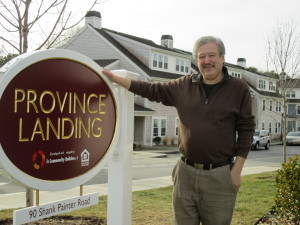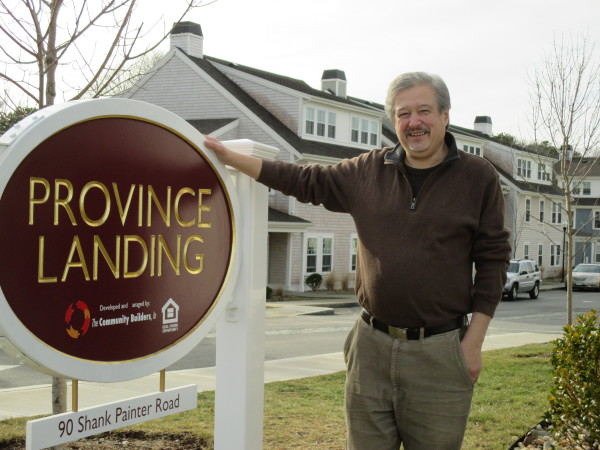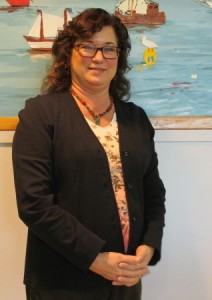PROVINCETOWN – “Every day people come in here in a desperate spot looking for housing,” said John Economos, sitting in his office at Province Landing, a 50-unit affordable rental housing development on Shank Painter Road.

John Economos, senior manager for Community Builders, at Province Landing, a 50-unit affordable rental housing development on Shank Painter Road.
Economos, senior manager for Community Builders, which operates Province Landing and three other affordable housing developments on Cape Cod – in Sandwich, Mashpee and Chatham – understands the desperation people feel. For six years, he lived in Provincetown, a place he loves. But because the Provincetown apartment that he rented was in a building up for sale, he had to move to Orleans and now commutes to Provincetown for work.
Stories like that of Economos and those who visit his office looking for housing have become so common in Provincetown that the town recently held its second housing summit since 2006 to address the continued loss of year-round rental housing.
“The 2006 Needs Assessment was that we needed 250 new units,” said Michelle Jarusiewicz, Community Housing Specialist for Provincetown. Jarusiewicz organized the recent summit. “We have created 70 new units,” she said.
But during that same time, according the Housing Needs Assessment Update prepared in December 2013 by John Ryan, a housing consultant and the principal of Development Cycles of East Montpelier, Vermont, there were 376 condominiums permitted in Provincetown. The report stated, “The vast majority of these units are conversions of small multi-family properties to second homes. These units constitute a not insignificant share of the town’s remaining rental stock.”
The sad town-wide math of adding 70 new year-round units while subtracting 376 year-round units was best summed up in a metaphor by Ryan, who said, “It’s like pouring water into a bucket that has a hole in the bottom.”
Provincetown is becoming something of a Yogi Berra routine: so popular that no one lives here anymore.
“It’s been happening for the whole time I’ve been here,” said Bob O’Malley, broker/owner of Beachfront Realty in Provincetown. He has been in Provincetown for 29 years.
For all that time, he said, “locals have been relocating to Truro and Wellfleet. Eastham became a bedroom community for Provincetown. There has been a continued influx of second homeowners, and the price is driving local people out of the market.”
Jarusiewicz said, “In the late 90s it really started kicking in that a lot of people had to leave town because they couldn’t find housing, any type of housing.”
“It’s the forces of the market,” said Ted Malone, founder and president of Community Housing Resource Inc., a developer of housing, much of it affordable, on the lower Cape. “There are people with much higher incomes who want to be here.”
As Malone said, “it’s a beautiful place to be,” and homeowners have learned that there are plenty of people willing to pay extremely high prices to rent a unit in the summer for “that week in paradise.”
In such a market, as Ryan said, “There are people who don’t have a lot of money competing with other people who do have a lot of money.” It is no surprise that the people with money win such a competition.
“The economics are all in favor of developing seasonal housing,” said Ryan. “That’s where you are going to get the most money.”
More often than not, the new owners do not live in Provincetown year-round, and many help offset their mortgage payments by renting their unit out weekly in the summer. “There are a lot of empty buildings in the winter time, “ said Jarusiewicz. “They rent it out for 12 weeks and then shut it down.”
Malone said the peak season is 10 weeks, but his point was the same. “When a weekly rental can get $1,200 a week for 10 weeks in the summer, and then you still get to use the property other than those ten weeks, it makes sense to rent it that way,” he said
But O’Malley said that many times the numbers will actually work in favor of the year-round rental. He said there is a high cost associated with weekly rentals. Among these are brokerage fees, cleaning fees and utilities.
“The problem is that the people who own these places want to use them for a few weeks a year themselves,” said O’Malley.
Economos said of all the conversions, “You can make so much money putting your place up for rent in the summer. It’s simple math.”
But that simple math for individual owners has led to an inescapable town-wide math. Everyone knows that these are not just numbers on a chart.
Economos and his wife lived in Provincetown for six years, five in the same place. “The owners are thinking of selling so it became basically a month-to-month lease,” said Economos. “You can’t take a chance that in June you will lose your place to live here.”
So after looking in Provincetown and finding nothing, the manager of an affordable housing development in Provincetown could not find affordable housing in Provincetown, so he moved to Orleans. His wife had dreamed of living in Provincetown from the time she was seven years old. “The way we looked at it, we can’t complain,” said Economos. “We got six good years in here.”
Jarusiewicz said, “I’ve had people like a 72-year-old who has been renting the same place for 20 years losing their place.”
Because of the town’s location at the end of the Cape peninsula, “nobody ever wound up in Provincetown by accident,” said Economos. “People are willing to put up with the struggles to stay here. When you see people who have to leave, it’s kind of heartbreaking.”
These are not rare occurrences. “We get calls daily saying, ‘I am going to be losing my housing,’ “ said Malone.
O’Malley is currently selling one of the few remaining multifamily buildings that has not been converted to condominiums. The building, on Conwell Street, is being sold by the owner/occupant, who pays the mortgage by renting rooms to seven other people.
Those seven units plus the owner’s unit, when the building sells, will most likely disappear from the rental market of Provincetown.
“The same person has owned it for 35 years,” said O’Malley. “The owner has rented it as a year-round rental, but the owner is older and not in good health and needs to sell it.”
The existence of the tenants, said O’Malley, is actually holding up a sale. If the building was vacant, said O’Malley, the property, listed for $900,000 would have sold in the six months since it has been listed. But it can be time consuming and expensive to evict tenants so buyers have shied away, he said.
“It will be sold most likely to a condominium developer,” he said.
Gloria McPherson, the town planner, has only been in town for three months but already she has heard stories.

Provincetown Town Planner Gloria McPherson owns property in western Massachusetts and in New Hampshire: “Even if I liquidate both of these properties, I still can’t afford to buy a home in Provincetown.”
“Some people spend time on friend’s sofas,” said McPherson. She has heard of “people in Town Hall moving two or three times within a year.”
In fact, even with her town planner’s salary, she said she had great difficulty finding housing at first when she landed the job of town planner. She now lives in a rental with a roommate, and they plan to rent out a room in the summer to help with expenses, she said.
She said she would love to buy in Provincetown and has assets to work with, including a house in western Massachusetts and one in New Hampshire. “Even if I liquidate both of these properties, I still can’t afford to buy a home in Provincetown,” said McPherson.
Economos said he moved to year-round rental in Orleans to avoid the other option of “the P-town shuffle – a spring and fall move.”
This spring and fall move by those without year-round housing is, of course, familiar in every town on Cape Cod. The Ptown Shuffle is the Cape Cod Shuffle. But like many things on the peninsula, it is a bit more pronounced in Provincetown.
“There’s not a single issue under the sun that someone else doesn’t face,” said McPherson. “Provincetown has a lot of issues around housing. None are unique to Provincetown. San Francisco has the problem of condo conversions. It’s a resort community, with limited housing, low wages, and aging population. Lots of places have that. But the conglomeration of all these issues is unique.”
It means that finding affordable year-round rental housing is somewhere between difficult and impossible and the only real strategy, said Jarusiewicz, is “Talk to everyone you know, at the grocery store, at the coffee shop. That’s how you find something here. Knowing someone, and timing.”
In Provincetown, gallons are a developer’s currency.
“Provincetown is essentially an island,” said McPherson.
“Seventy-nine percent of the land in Provincetown is in the Cape Cod National Seashore,” said Jarusiewicz. “There is a one-by-three mile stretch to develop, and in that are protections for open space and wetlands.”
“There is less land to work with,” said Malone. “We can’t really grow unbridled. We have a limited water supply.”
With limited building capacity and limited water resources, and a growing demand from very wealthy people from, essentially, all over the world, there is a Growth Management Bylaw, based on gallons used of sewer and water, said Jarusiewicz. “The town sets aside gallons for affordable only. The town has water restrictions. We can’t be indiscriminate about where we build.”
“It’s not like the town can go purchase a big chunk of land,” said Jarusiewicz. But the town has made big investments, including spending $1 million to buy the land for Province Landing on Shank Painter Road, she said.
“The town bought this piece of property and decided it should be affordable housing and it leased it to us,” said Economos. “Provincetown is one of the most pro-active towns my company has ever worked with.”
Province Landing, with 50 units from one bedroom to three bedrooms, opened in June 2012. There is a wide range of tenants, he said, including graphic artists, writers, people who work for a nursing home, people or work for the town, people on disability, and cooks.
While those are 50 people not forced to do the Ptown shuffle, or couch surf, or commute from another town, or just give up, Economos said of anyone trying for housing there, “We have so many applications. Realistically our wait list could be five to ten years.”
This is part of why Jarusiewicz held the second housing summit, which was attended by about 65 people, she said.
“It’s a complicated, multi-layer issue,” she said. “The developer usually has a lot of subsidies. He has to be in for the long haul. Getting in the queue for funding takes years.”
And different agencies have different standards to be met, she said.
Plus, said Malone, “There is a dwindling supply of resources to support affordable housing statewide.” And he added that “from conception to building is a 10-year process.”
As for what exists, O’Malley said, “A lot of Provincetown’s housing stock was old, from last century or even before that.”
“So much of the housing stock here is substandard housing,” said Economos. “The town has to work hard to enforce the code. And bringing it to code is expensive, so that’s another reason why they make it seasonal.”
“This is a much easier town than many to convert to condos,” said Economos.
Some are suggesting that part of the solution is making conversions more difficult. While there are tax incentives and subsidies available to have affordable housing, “It’s going to take real willpower,” said Ryan.
“The issue is can you make it harder to make these conversions where people would not have a chance to cash out their investment in a way those did before them,” he said. “I don’t know how much appetite there is to do that in the community.”
Although there have been a large number of conversions, Ryan said, “That number is going to slow because there are fewer properties left that can be converted.”
Ryan added, “The only alternative I see is having a stable of year-round housing that can’t be sold and that will remain year-round housing. The community has to say, we are drawing a line in the sand here and we are not going to let our year-round community slip away. The community is actually everybody.”
Click here to see our other stories about Provincetown.
– Please like us on Facebook.
— Brian Tarcy

































I question the “affordable housing” model that some developers use to qualify for the tax benefits etc. available and offer the very minimum requirements as to the number of affordable units actually available and charge “market rate” for the bulk of the units in the developments. More over-priced housing is not what is needed to solve the year-round housing crisis on the cape or here on the Vineyard.